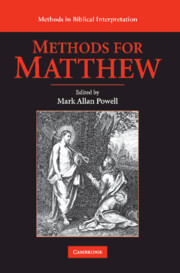Book contents
- Frontmatter
- Contents
- Methods in Biblical Interpretation
- Abbreviations
- About the Contributors
- Introduction
- 1 The Historical-Critical Method and the Gospel of Matthew
- 2 Literary Approaches and the Gospel of Matthew
- 3 Feminist Criticism and the Gospel of Matthew
- 4 Historical Jesus Studies and the Gospel of Matthew
- 5 Social-Scientific Approaches and the Gospel of Matthew
- 6 Postcolonial Criticism and the Gospel of Matthew
- Glossary
- Annotated Bibliography
- Subject Index
- Scripture Index
3 - Feminist Criticism and the Gospel of Matthew
Published online by Cambridge University Press: 05 June 2012
- Frontmatter
- Contents
- Methods in Biblical Interpretation
- Abbreviations
- About the Contributors
- Introduction
- 1 The Historical-Critical Method and the Gospel of Matthew
- 2 Literary Approaches and the Gospel of Matthew
- 3 Feminist Criticism and the Gospel of Matthew
- 4 Historical Jesus Studies and the Gospel of Matthew
- 5 Social-Scientific Approaches and the Gospel of Matthew
- 6 Postcolonial Criticism and the Gospel of Matthew
- Glossary
- Annotated Bibliography
- Subject Index
- Scripture Index
Summary
Many have undertaken to write a comprehensive account of the development of feminist biblical criticism generally and of feminist New Testament studies in particular. In this chapter, it seemed good to me, having followed these things closely from the beginning, to give an account of how this particular hermeneutical approach has been manifest in Matthean studies. Similarly, however, to the way in which the Lucan “orderly account” (Luke 1:1) remained in dialogue with many other undertakings, so too will this exploration of what is unique to Matthean feminist interpretation have as its dialogue partner the past twenty-five years of feminist New Testament and Gospel criticism.
Twenty-five years is a significant marker for this study as 1983 saw the appearance of In Memory of Her, Elisabeth Schüssler Fiorenza's groundbreaking reconstruction of early Christian origins and her provision of a theoretical framework for feminist New Testament studies that would impact the discipline for the subsequent quarter century. It was also the year in which the first specific feminist study of Matthew appeared, namely Janice Capel Anderson's “Matthew: Gender and Reading,” which was the opening article in an edition of Semeia entitled The Bible and Feminist Hermeneutics, edited by Mary Ann Tolbert. Both these studies model what has developed in feminist New Testament interpretation. First each author explores feminism as a hermeneutic, perspective, ideology, or worldview that informs every aspect of her interpretive project.
- Type
- Chapter
- Information
- Methods for Matthew , pp. 83 - 117Publisher: Cambridge University PressPrint publication year: 2009
- 1
- Cited by



